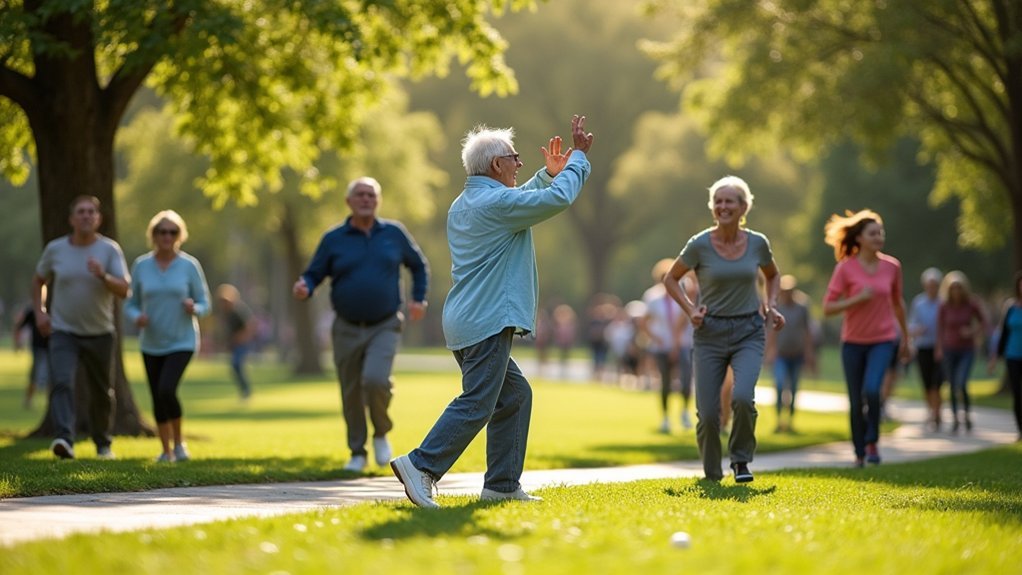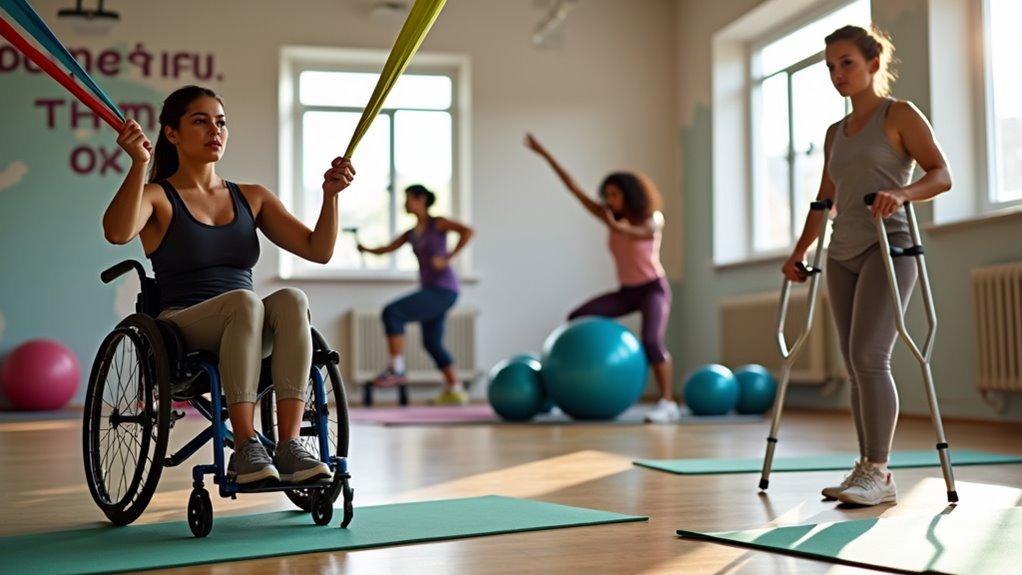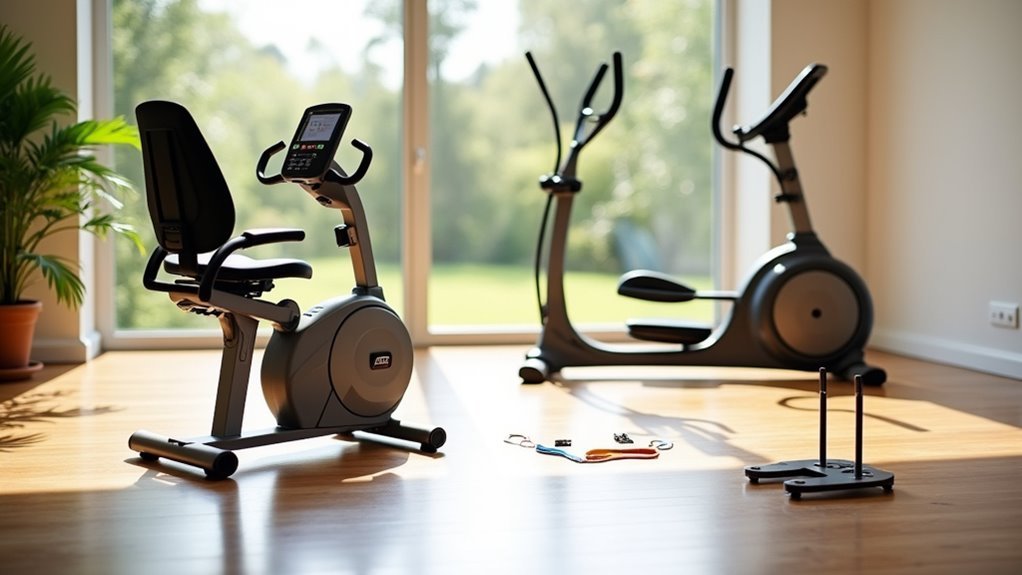Physical activity directly enhances your cognitive function through biochemical changes in your brain. When you move, your body releases BDNF and IGF-1, chemicals that promote neuroplasticity and brain growth. Regular movement—even simple chores and walking—can make your brain perform as if it’s four years younger. You don’t need intense workouts; consistent everyday activities provide significant benefits. Both adolescents and older adults experience cognitive improvements with just 5-10 minutes of additional daily movement.
8 Second-Level Headings for “What Links Cognitive Health to Physical Activity?”

Numerous studies have established clear connections between regular physical activity and improved cognitive function across different age groups. Research from Penn State shows that daily activity can boost cognitive processing speed in adults aged 40-65, equivalent to being four years younger cognitively.
For older adults, the benefits are particularly significant. Studies in India found that frequent physical activity improved cognitive scores by 1.32 points in women and 0.98 points in men.
Whether you engage in light or vigorous activities, you’ll likely experience cognitive health benefits proportional to your activity frequency.
The relationship between physical activity and cognitive function also affects healthcare utilization, with cognitive improvements accounting for 17% of reduced doctor visits.
These benefits stem from increased brain-derived neurotrophic factor levels, which promote neuroplasticity essential for maintaining cognitive health.
The Science Behind Movement and Brain Function
The physiological processes behind movement’s impact on cognition reveal why physical activity boosts brain health so effectively. When you engage in physical activity, your body releases chemicals that promote brain growth and plasticity.
| Brain Benefit | Activity Type | Cognitive Improvement |
|---|---|---|
| Increased BDNF | Walking, Chores | Processing Speed |
| IGF-1 Production | Moderate Exercise | Abstract Reasoning |
| Neural Plasticity | Regular Movement | Problem-Solving |
| Brain Growth | Both Light & Intense Activities | Executive Function |
Research shows that even light activities contribute considerably to cognitive health. The frequency of your physical activity matters more than intensity—regular movement can make your cognitive processing equivalent to being four years younger. While working memory improvements weren’t significant in studies, the enhancements to executive function and processing speed demonstrate that staying active keeps your brain sharper at any age.
Everyday Physical Activity vs. Structured Exercise for Cognitive Benefits

You don’t need a gym membership to boost your brain power, as research shows even daily chores can improve cognitive function equivalent to being four years younger.
While both high and low-intensity movements benefit your thinking skills, doing more frequent activities throughout the day matters more than extended workout sessions.
Everyday tasks like walking, cleaning, and gardening count toward your cognitive health, making brain-boosting physical activity accessible regardless of your fitness level or schedule.
Movement Intensity Matters
While many believe structured exercise is necessary for brain health, recent research suggests even casual movement plays a crucial role in maintaining cognitive function.
Both light and vigorous physical activity contribute to improved cognitive health, potentially making you feel up to four years younger mentally.
The key isn’t necessarily how hard you move, but rather how consistently you do it. Even brief periods of movement can temporarily boost your cognitive benefits.
- Feel mentally younger through regular movement of any intensity
- Transform mundane activities into brain-boosting opportunities
- Free yourself from the gym requirement while still nurturing your brain
Your cognitive health benefits from all movement intensity levels, so incorporate more frequent physical activity throughout your day rather than focusing solely on structured workouts.
Frequency Trumps Duration
Consistently engaging in frequent bouts of physical activity throughout your day delivers more cognitive benefits than less frequent, longer workout sessions. Research involving 204 participants confirms that regular physical activity, regardless of intensity, improves cognitive processing speed—equivalent to being four years younger cognitively.
| Activity Type | Cognitive Benefits |
|---|---|
| Daily walks | Enhanced processing speed |
| Household chores | Improved cognitive function |
| Gardening | Mental agility boost |
You don’t need structured exercise routines to maintain cognitive health. Even light everyday activities like walking or housework contribute considerably when done frequently. The key finding: how often you move matters more than how long each session lasts. By incorporating multiple movement opportunities throughout your day, you’re actively supporting your brain’s long-term health and functionality.
Daily Chores Count
The distinction between everyday activity and structured exercise deserves attention when considering cognitive health benefits. You don’t need a gym membership to boost your brain power.
Research from Penn State shows that daily chores and walking can improve cognitive processing speed equivalent to being four years younger. Both lower and higher intensity activities contribute to brain health.
- Feel empowered knowing that folding laundry, gardening, and climbing stairs all count toward cognitive health gains
- Celebrate small victories as even brief movements throughout your day temporarily enhance brain function
- Embrace simplicity in knowing regular physical activity through everyday tasks builds long-term cognitive resilience
The frequency of your movement matters more than duration, so incorporate more activity into your daily routines for maximum benefits.
Age-Related Considerations: From Adolescence to Older Adults

Physical activity plays an essential role in cognitive development and maintenance throughout the lifespan. If you’re a teenager, you need at least 60 minutes of moderate activity daily to support your cognitive health and overall development, as recommended by WHO.
Without regular physical activity, you may experience lower life satisfaction and declining cognitive function.
For older adults, staying active isn’t optional—it’s transformative. Regular physical activity can greatly improve your cognitive functioning, with physically active men seeing nearly a one-point increase in cognitive scores and women experiencing even greater benefits at 1.32 points.
The cognitive benefits work through increased brain-derived neurotrophic factor and enhanced executive functions. Whether you’re 15 or 75, each additional day of activity contributes to better cognitive test performance.
Duration, Intensity, and Frequency: Finding the Optimal Balance
When considering how much exercise you need for better brain health, finding the right balance of duration, intensity, and frequency becomes essential.
Research shows that 150 minutes of moderate-intensity activity weekly provides ideal cognitive health benefits. You’ll see improvements regardless of whether you choose higher or lower intensity workouts—both can make your brain function as if it’s four years younger.
Invest 150 minutes weekly in brain health—your mind could function four years younger, regardless of workout intensity.
- Be patient with progress – Cognitive benefits typically emerge after six months of consistent activity, requiring commitment before you’ll notice changes.
- Mix up your movements – Various exercises from walking to tai chi support brain health, giving you flexibility in your routine.
- Embrace everyday motion – Frequent physical activity, even routine tasks like chores, contributes considerably to cognitive improvements.
Neurological Mechanisms Behind the Physical Activity-Cognition Connection
While you exercise, remarkable changes occur deep within your brain, creating a cascade of biological effects that enhance your cognitive abilities. Your body increases production of BDNF and IGF-1, two critical compounds that stimulate brain growth and neuroplasticity.
When you engage in physical activity, especially aerobic exercises, you’re improving oxygen delivery to your brain, optimizing cognitive function. Your brain responds by releasing neurotransmitters that sharpen attention and cognitive processing. These changes support your executive functions, including abstract reasoning and problem-solving capabilities.
The structural improvements are tangible—increased hippocampal volume directly correlates with better memory and learning.
Your brain’s enhanced neural growth and connectivity from regular activity form the biological foundation for cognitive resilience and improved mental performance.
Cultural and Demographic Factors in the Activity-Cognition Relationship
Across diverse communities worldwide, the relationship between physical activity and cognitive health reveals fascinating cultural and demographic variations. Research from the Bronx shows how everyday movement improves cognitive processing speed across ethnic backgrounds, while India’s Longitudinal Ageing Study highlights gender differences—women gain 1.32 cognitive points from regular activity compared to men’s 0.98.
Global studies reveal physical activity boosts cognitive health differently across cultures, with women often experiencing greater benefits than men.
Cultural factors greatly influence this relationship through:
- Access disparities – cultural attitudes and resource availability affect your ability to engage in beneficial physical activities.
- Gender-specific benefits – women may experience more substantial cognitive improvements from regular movement.
- Activity preferences – the types of physical activities valued in your community shape cognitive outcomes.
Understanding these demographic patterns is essential for developing effective cognitive health interventions, especially in low-resource settings where cultural contexts shape activity patterns.
Practical Applications: Incorporating Brain-Boosting Movement Into Daily Life
You can boost your brain health by simply incorporating more movement into your everyday activities, from taking the stairs to gardening or walking to the store.
Creating sustainable activity habits doesn’t require expensive gym memberships or complicated workout routines—instead, focus on finding enjoyable ways to move that you’ll actually maintain long-term.
Even brief movement breaks throughout your day can provide immediate cognitive benefits, making consistent physical activity one of the most accessible tools for maintaining mental sharpness.
Everyday Motion Benefits
When it comes to boosting brain health, you don’t need elaborate workout routines or expensive gym memberships.
Research shows that everyday physical activities like walking or doing household chores can greatly improve your cognitive health, providing benefits equivalent to being four years younger cognitively.
For older adults, regular physical activity is particularly valuable.
Even brief minutes of movement daily can temporarily enhance your thinking and lead to lasting improvements over time.
- Feel mentally sharper with just a few minutes of daily movement
- Reclaim years of cognitive youth through simple household activities
- Protect your brain health by incorporating more frequent movement throughout your day
Activity Habit Formation
Creating lasting brain-boosting activity habits requires the same discipline as taking daily medication. Aim for 150 minutes of moderate-intensity physical activity weekly to protect against cognitive impairment. Start small—increase your daily movement by just 5-10 minutes and gradually build up.
Remember, you don’t need a gym membership to support your mental health. Walking, household chores, or brief exercise sessions throughout your day contribute greatly to cognitive function. These everyday movements become powerful when performed consistently.
Be patient with your cognitive health journey. Research shows that the brain benefits of regular physical activity typically emerge after six months of dedication.
Your persistence will pay off—regular exercisers often process information faster and report feeling cognitively four years younger than their sedentary counterparts.
Frequently Asked Questions
How Does Physical Activity Affect Cognitive Health?
Physical activity improves your cognitive processing speed, making you mentally sharper. When you exercise regularly, you’ll boost brain-derived neurotrophic factor, enhance executive functions, and reduce anxiety symptoms—giving you benefits equivalent to being four years younger.
What Influences Cognitive Health?
Your cognitive health is influenced by physical activity, which releases BDNF and growth factors. You’ll see benefits after six months of consistent movement. Even light activities can make your brain function years younger.
What Is the Relationship Between Physical Activities and Cognitive Changes?
Regular physical activity improves your cognitive processing speed, making you mentally sharper – equivalent to being four years younger. You’ll see these benefits after six months of consistent exercise, especially when you maintain 150 minutes weekly.
Is There a Link Between Physical Activity and Mental Health?
Yes, you’ll experience improved mental health through regular physical activity. It reduces depression, anxiety, and stress while boosting self-esteem and releasing brain chemicals that enhance mood and cognitive function.
In Summary
You’ve seen how physical activity directly impacts your brain’s well-being through multiple pathways. Whether you’re young or aging, the evidence is clear: moving your body strengthens your mind. You don’t need extreme workouts—even regular walking makes a difference. By understanding these connections, you’re now equipped to make informed choices about exercise that will support your cognitive health throughout life.





Leave a Reply